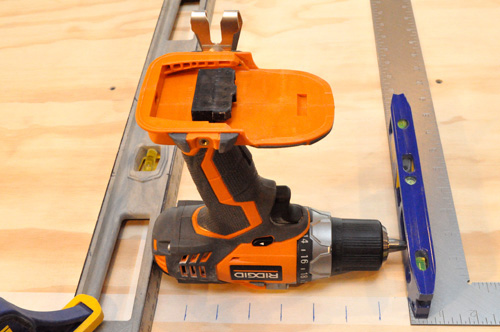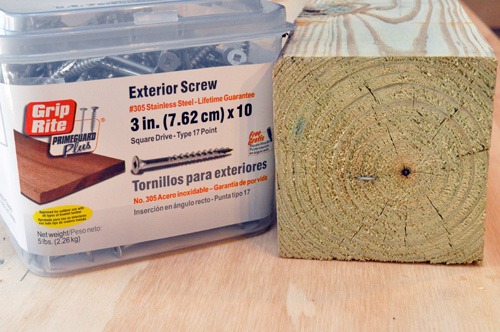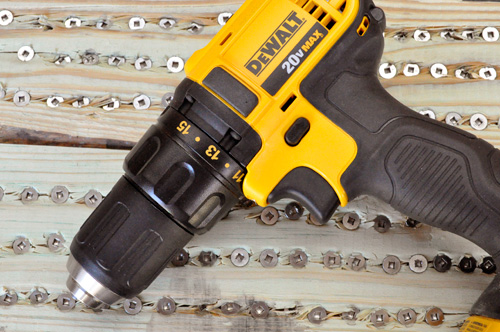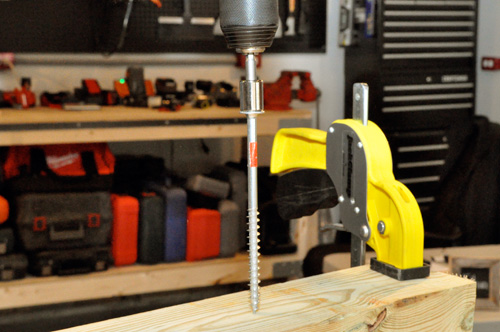
If you read press releases or simply watch commercials around the holidays, you know that just about every tool manufacturer makes some sort of “best in class” statement regarding their product. Consumers don’t know who to believe anymore, and besides, what does marketing hype actually mean for the contractors and DIYers in the field? Who really has the best tool for the job? To dig deeper, we’ve pitted five popular drill/drivers against each other to find out who has the smallest, lightest and longest lasting product available. The numbers we share are the results of our own independent, unbiased testing. You won’t find any corporate claims or specifications here.
The Drivers
Before we jump into the testing, lets introduce the contestants. Each of these drivers was introduced in 2011 and fits into the compact, 18v category, and each is still the vendor’s current compact offering as of March, 2012. Each tool maker boasts that their product can meet the needs of general contractors, tradesmen, and serious DIYers alike. The feature sets present in this group are strikingly similar, with all models having 4-pole motors, LED work lights, 1/2″ ratcheting chucks, 2-speed gear boxes, variable speed motors, and removable belt hooks. Here’s the lineup:

Porter Cable PCL180CDK, Bosch Compact Tough DDS181, Kobalt KT200A,
DeWalt 20v Max DCD780, Ridgid Fuego R86008K
The Batteries
A cordless driver is only as strong or resilient as the battery that powers it. For each tool, we used its corresponding 18V lithium-ion battery, fresh off the charger. These batteries were new (< 5 recharges) at the time of our test. You might think that DeWALT has an unfair advantage with its 20V Max tool, but if you investigate the 20v Max line, you’ll find DeWALT states that the maximum initial battery voltage (measured without a workload) is 20 volts. Nominal voltage is 18 volts, just like the rest of these tools.
Most manufacturers offer a slim 1.5Ahr battery and a longer lasting 3.0Ahr battery. Porter Cable is the only exception to this; their slim LX battery pack is a rated at only 1.3Ahr. We used the slim battery packs for all of our tests.

The Tests
The main performance factors to consider when purchasing a cordless drill driver include weight, size, power, and run time. These are the big four, and every year tool engineers fight for even the slightest advantage among these traits.
Weight and Size: We tested each driver for weight with the battery attached, and the margin of victory was measured in hundredths of a pound. Small driver size (with more emphasis on overall front-to-back length) is crucial when you’re working with limited access, and the top three performers were within 3/8″ of each other.


Run Time: To measure run time, we purchased pressure treated 4×4’s, and 3″ stainless steel, square-drive screws. Using a fresh battery, we drove as many screws as possible until the driver quit, and at the end of testing, we had gone through more than 1,000 screws.


Power Driving: In contrast to the smaller screws in our run time test, we used a handful of 3/8 x 6″ lag screws to determine which driver could deliver the most torque power. Since we didn’t have a way to measure actual torque, we had to use our own judgment in ranking which drivers delivered the most power-driving capability based on their ability to drive the lag deep into the block.

The Results

Kobalt KT200A
5th Place: The Underachiever
Across the board, the Kobalt KT200A performed poorly, coming in last or next to last in every one of our tests. Its weight and size place it among the biggest and bulkiest of the drivers we tested. If that weren’t enough of a deal-breaker, the KT200A drove an embarrassingly small number of screws–just 131, or more than 70 less than the next closest competitor. The tool was also quickly tapped out in our lag screw competition, dying first in our test. The results were so poor that we question whether or not our particular model is somehow defective. Surprisingly, Kobalt has this driver priced at $149, which is in line with the others. For that reason, the KT200A isn’t worth considering for your next purchase.

Porter Cable PCL180CDK
4th Place: The Achilles Heel
Despite its 1.3Ahr battery, the PCL180CDK performed admirably in our run time test and placed second in our lag screw test. Unfortunately, its smaller and lighter counterparts edged out the Porter Cable with slightly better numbers. We suggest that Porter Cable upgrades this battery to a 1.5Ahr battery to level the playing field.

Ridgid R86008
3rd Place: The Heavy Weight
The differences between 1st, 2nd and 3rd place was very small, and that really speaks to the level of competition between manufacturers in this genre. Ridgid’s latest offering is quite compact, yet it’s the heaviest among those we tested. The R86008 performed reasonably well in our run time test with 203 screws driven and placed first in our lag screw power test. Despite its perks, the Ridgid takes 3rd place because both DeWALT and Bosch put on a stunning performance in these tests. While not a factor we considered in ranking these drivers, we think the Ridgid has the best feature set and grip feel of the line-up. It also boasts the best warranty.

DeWALT DCD780
2rd Place: The Runner Up
At just 3.5 lbs, the DeWALT DCD780 feels light and balanced in your hands. But don’t be fooled–this driver packs a punch that belies its small form factor and slim grip. We were very pleased with the all around solid performance of the DCD780. It delivered second place performances in both our run time and power driving tests, and has the second-best grip feel of all of the drivers in this test.

Bosch DDS181
1st Place: The Marathoner
Bosch’s DDS181 showed surprising longevity, besting the other drivers in our run time challenge with 238 screws driven. While it ranked only third in our power drive competition behind the Ridgid and DeWALT, Bosch manages to cram everything this tool offers into the smallest form factor with the lightest weight in the group. With performance like this delivered in such a compact form, awarding Bosch our top pick is a no-brainer.
Tabular Results
| Rank | Brand | Model | Weight (lbs) | Length (inches) | Height (inches) | Run-Time (# screws) | Lag screws (qualitative) | Battery (Ahr) | Current Price (driver, 2 slim batteries, charger) |
|---|---|---|---|---|---|---|---|---|---|
| 1 | Bosch | DDS181 | 3.47 | 7-9/16 | 9-1/8 | 238 | ✓ | 1.5 | $149 |
| 2 | DeWalt | DCD780 | 3.49 | 7-15/16 | 8-13/16 | 214 | ✓✓ | 1.5 | $195 |
| 3 | Ridgid | R86008 | 4.02 | 7-7/8 | 8-15/16 | 203 | ✓✓✓ | 1.5 | $179 |
| 4 | Porter Cable | PCL180CD | 3.75 | 8-9/16 | 9 | 209 | ✓ | 1.3 | $153 |
| 5 | Kobalt | KT200A | 3.87 | 8-1/2 | 9-13/16 | 131 | 1.5 | $149 |
What We Didn’t Test
While we think the four areas we focused on provide a good basis for comparing these tools, it’s worth noting that there are more factors we either could not test, or did not include in the rankings. They are as follows [with reasons for not including the item in the rankings shown in brackets]:
- Longevity of batteries over multiple charges [required too much effort and time–we wish we could have done this]
- Battery charge time [insignificant difference between tools]
- Durability of parts [requires more data points than we can amass with our limited sample]
- Warranty [only applies to tools that fail to perform, and so must be weighed as only one factor in total quality]
- Drilling Speed [we considered this, but believe that our driver tests would align pretty closely with drilling performance]
- Convenience Features [for many convenience features, what is important to one buyer is not important to another]
What about a Drop Test?
Based on reader feedback, we considered doing a “drop test” of the tools from an 8-foot step ladder to see which ones still worked after a hard landing. We decided against it, because we thought that such a test would be too narrow in terms of the number of data points we could report. We might end up unfairly rewarding or criticizing one of these tools based on “a lucky landing”, something that we didn’t want to skew our results.







Seems like the top 3 would work well for DIY as well as Pro users. Can the same be said of the PC? Maybe it depends on the kind of work.
Good call on the drop test.
The PC driver isn’t a bad choice, so if you’ve already bought into that line of tools / batteries, don’t feel like you’re missing out on too much. It performed well in the run-time and lag screw test, but it’s also one of the bigger and heavier options.
I’m sure you guys could rig a chute with a trap door or something that would keep the tools oriented properly and repeatably. Think about how MythBusters would do the drop test.
I liked the idea of the drop test from a durability perspective, but felt like it would be hard to really put the tools on “even footing” for the test. There would be a lot of luck in the landing. Also, as Jake mentioned below, we really would like to make you guys the owners of these tools at some point (likely via the rewards center).
Convenience Features…like how easy it is to put everythng back in the case after the job is done for the day. 😀
You didnt just want to break the drivers?? Thats no fun.
Its nice to see that the Bosch comes with a case, and is among the cheapest.
They couldn’t do the drop test and break them all….then how would they give them away to us? 😀
Exactly! We do plan to add at least 1 of these kits to the Rewards Center, and it won’t be the Kobalt… We need to make sure we’ve exhausted them for tests purposes before we do that, though! I would still like to give you all a look at the impact driver that came with the Ridgid kit.
Well, at least I’ve narrowed down my hubby’s b-day present to the top three choices…thanks for the help!
I’m really happy we did this test objectively. While Ethan did most of the testing, I did get to add my $0.02 into the results write-up above. But I did want to add a few of my personal thoughts/opinion.
I really like the Ridgid 18V model. I like the grip. I like the LED lighting placement. And I like the power it delivers. If I had to pick among the group, I’d pick the Ridgid, even though it’s about 15% heaver than then lightest among the group.
The two things I believe should impact your choice, beyond what we’ve measured here, is battery life and overall durability. In that department, I feel very good about DeWALT and Bosch, based on reputation. I have growing confidence in Ridgid. I’ve personally had a few recent bad experiences with Porter Cable’s batteries, and we’ve also had a 12V Porter Cable impact driver start leaking some type of fluid after not very much use at all.
As for the Kobalt, well… I’m surprised at how poorly it fared in this competition. It makes me really wonder if we’ve been given a defective battery. I’ll be looking forward to Kobalt’s next generation of the tool to see how far they’ve come.
Where is the Makita? I’d be interested in seeing how it would do.
Hey Harold,
We’d have loved to include Makita and Milwaukee in the test, but we didn’t have those drivers at hand. If we get the chance, I’ll be sure to re-run the test and update this article with the results.
Nicely designed study! Might be interesting to see cost comparisons of the original cost vs. building the same model from ordering all of the replacement parts, just for something fun to do!
I researched drill/drivers for weeks before purchasing mine. I have to say I was disappointed, yet again, to run across a Dewalt and Bosch is the best tool review. If you really compare RPM, torque, and build of the tool…these so called master tools don’t even rank. They are terribly cheap looking and have plastic chucks! For 200 dollars I at least want a metal chuck. Even Black and Decker tools have metal chucks. Then you examine the battery charge time, some of them have to charge for two hours! It was a no brainer for me, the last one on your list…metal chuck, 455 lbs of torque, 20 min battery charge time, ratcheting chuck. I guess “pros” prefer cheap plastic tools.
Leigh,
We too had hoped the Kobalt would perform better in our tests, but alas, it didn’t. And the performance was so stunningly bad, we questioned whether our tool was a lemon.
The big challenge for Kobalt is most likely battery chemistry, for which the other brands are leaps and bounds ahead of them.
Sorry, but we aren’t mouthpieces for either DeWalt or Bosch. The results speak for themselves. Had the Kobalt won, we’d have given it the top slot. Sorry you bought it without having seen an objective performance comparison.
Hey Leigh,
We don’t have a pony in this race so it doesn’t matter to us who wins, and the numbers speak for themselves. The Kobalt driver was one of the biggest, and heaviest and it crapped out first in run-time and lag screw competition. You can spout manufacturer numbers all day, but it doesn’t change the results. Furthermore, Kobalt, DeWalt and Bosch all claim (unverified) 30 minutes or less charge time. By all means, purchase what you feel performs best, but you won’t see me in the checkout line.
Also keep in mind Leigh that these are the compact versions. Often marketed to home owners and budget minded pros. The higher end tools made by Dewalt, Bosch, and most other manufacturers feature metal chucks, longer battery run time, hammer drill function, higher cost, and a lot more weight.
Awesome post!! I’m going to need a new driver soon. Was thinking maybe a small impact driver too, but the Bosch will get another look from me now.
I like the way you tried to keep objectivity out of your testing and left it for the post test comments. I, like most serious tool buyers, did a great deal of research before spending my hundreds of dollars on a tool set. Although I liked the reputation and extensive use of Dewalt by contractors, the Ridgid tools just felt better in my hands. I also love the idea of life time warranties (be careful though, prospective buyers of Ridgid tools off of ebay, you don’t get the life time warranty without a valid receipt from an authorized dealer/seller).
I agree that the top three are grouped quite closely together. I disagree with the ordering because I personally favor superior torque over number of screws driven, so I would have chose the Ridgid as top finisher. Granted, I am biased because that is what I bought.
One last thing, Home Depot is having a free battery with selected Ridgid tool sets offer through April. You get the same type of battery that comes with the set. Essentially, you wind up getting three batteries (two in the set and one for free) for a about 10% less than buying three batteries separately, and then of course you get the tool and the charger for free!
Thanks for the great site! This is my first day reading your site, but certainly not my last. I came to you by way of the TIny House Blog, a great read for DIYers who are looking to downsize their impact and upsize their savings.
Carey
My dad always owned DeWalt cordless drills and I just bought an 18V myself. They are very well made and always feel like pro-grade tools.
I’ve got an older Makita 14.4v kit that’s been holding up really well even as it nears 7 years of age. My dewalt 14.4v kit’s batteries died about a year ago but it was about 10 years old so I can’t really complain. You can’t go wrong with any of the biggies, Bosch, Dewalt, Makita, Milwaukee.
From what I’ve heard Ridgid is made by the same parent company that makes Milwaukee tools. Dewalt (Pro quality), Porter Cable (DIY), and Black and Decker (Homeowner) are all made by the same parent company.
I’m waiting to see what the shake up is with brushless technology. The Milwaukee Fuel line looks really nice but I’m hoping they offer a drill/driver and impact driver combo kit. I’m a little disappointed by Makita’s brushless kit as it seems underpowered.
I’m still rocking my DW 14.4. The drill is an XRP (metal gears) but the batteries are only XR. Been a sweet drill except the batteries.
Ryobi is also under the same parent company (TTI) as Milwaukee and Ridgid power tools. Ridgid’s stationary power tools and hand tools are made by other companies though.
If you do end up getting into the Milwaukee Fuel line don’t settle for the compact batteries. They don’t have enough juice to get the full torque out of the driver. That was apparently one of the drives behind the free large battery inclusion recently. According to Jay at CopTool, “We would strongly advise using the XC batteries with these tools! When used with the compact M18 batteries these tools drop from 725 in-lbs torque to 650 in-lbs torque because the smaller battery does not have the juice to power the brushless motor properly. These kits were clearly a result of bowing down to the large box stores that demand a price point and are far less concerned with tool performance.”
XRP on my end too. I can’t justify replacing the batteries when an entirely new kit would only be a few bucks more. Yes! I’d forgotten that Ryobi was under them as well thanks for that info.
And thank you a bunch for the info on the batteries in the Fuel line. One of the big reasons I’m looking at that line over the Makita is because of the increased torque (I’m almost certain that 1/4″ tapcons will be the death of my 14.4 impact driver), defeats the purpose if it won’t perform!
I realize this is an older post but it is still informative for shoppers like myself. I currently have an all ryobi line due to the lower cost of entry. When I was in college I could get more tools for less money and the warranty service was great. If something broke or just didn’t work Home Depot was great about swapping it out without a receipt. Now that I’m in the working world and have more/any income I’m looking at slowly upgrading to a DeWalt line. I liked the areas of information that y’all reported the two other factors I personally look at is the warranty and the expansiveness of the product line. I like to think that with one type of battery I can use a wide variety of tools. This is part of the reason I like Ryobi and DeWalt for their consistent wide variety of offerings. In the future it would be great to see a review of the more instrument type tool lines from Milwaukee, DeWalt, Ryobi in the areas of Inspection camera, infrared temp sensor, laser level. Thanks.
Thanks for the comparison. My brand of preference has always been DeWalt, and it’s good to see that they were a solid contender. No Makita in the competition?
Hi poiboybf, We didn’t exclude Makita on purpose, but we didn’t have one handy when we ran these tests. Thanks for the comment.
Me I prefer Porter Cable you can’t beat it for the bang for your buck and the quality of the tool which is equal to the other tools if not better. Plus you can buy just the tool without the battery and charger which saves you a lot of money.
I think PC has a good product too, but I hope they upgrade their batteries (1.3 rather than 1.5 Ah). Also, you can buy bare tools from lots of manufacturers. Despite my own testing, I still reach for the Ridgid a lot so I guess the numbers don’t tell the whole story. Thanks for commenting, and I hope to see you around OPC again!
I would like to see how Makita and Milwaukee stack up against these as well. My friend has a Makita that I’ve used and it worked great. The new Milwaukee M18 Fuel lineup looks great, but I haven’t had the chance to use or see them in actual use yet.
I have LOTS of late model tools including a full array of Dewalt 18V (no Lithium Ion’s) that I have replaced the batterys a couple times over a 8 yr period. Get used more than average home user, but less then a pro. Been great tools. They are XRP’s where available.
But…I have a 14.4V 3/8″ DW drill that I bought when they first came out with 14.4’s and it’s still on the original battery. AWESOME drill. I bought a 9.6v (for lightweight) a couple years ago and the battery pack lasted about 15 charges. So a friend gave me a B&D with a broken chuck that happened to use the same battery. Back in business.
BTW, great review info.
Brian, thanks for adding your input and for the heads up on the 14.4 going the distance. My friend’s DW 14.4 also has held up well. Wonder if it had particularly good battery chemistry. Hope you’ll become a regular reader.
This is very useful, but man, I can just hardly tell a difference between the brands. I think you could put any one of these in my hand and I won’t know the difference. Throw in Milwaukee and Makita and I’m still back to buying based primarily on price. But I’m a casual DIY’er, so I don’t have great demands either. Good analysis.
I didn’t end up going with any of these. I ended up going with the Makita set. Plus, they were having a promotion for another bare tool for free. So, I picked the circular saw.
Hey…. I just noticed you said the Dewalt and Porter Cable both came in 2nd place in the Lag Screw Test. I assume Dewalt did come in 2nd.
What a great effort by you and the team for this site..I enjoyed reading all the posted comments as well….Now I have a informed idea of what to look for when going to Lowes today when i purchase my new drrill…Look forward to you next write up..jp
will you guys ever test hilti? i know it is expensive and all but….
Great article. I have been looking to purchase a Compact Drill Driver. I hadn’t considered the Bosch model, but it will definitely be tops on my list.
Kobalt and Rigid? Really?
Without Makita and Milwaukee in the test it sorely lacks cred.
good article – i am replacing a 22 year old Makita 12.6 v only b/c i cant get a replacement charger cheaply – new charger & 1 battery will be ~$80 & still old technolgy. I was going with a new 18V Makita, but the Ridgid warranty blows the otehrs away – FREE batteries & service for Life. how can you resist that?
Great information guys! I’m keeping my eye out for the PC 20v drill that’s pretty new, but I’ll definitely be referencing this review before I decide to buy! Until then, I’ll be using the old’ trusted corded Makita! Thanks again guys! -Matt
I have dropped my 18 volt kobalt 16 feet onto concrete once and several times had it slide down metal roofs and. hit the ground. I build pole buildings for a living and screw off thousands of feet of val rib a week and the only thing that has happened is ive worn out the batteries that loses replaced no questions asked. great tool would definately buy again.
sorry that was lowes replaced no questions asked and the gun is a kobalt 18 volt impact to be specific
Nice presentation on what is a highly competitive product market sector.
It seems that the real challenge for any cordless tool maker is battery specific: power vs. weight vs. run time vs. charge time vs. cost. The only companies that I’m aware if that guarantee batteries with free replacement are those newest to the market or aggressively shifting tier level within the market. A true “loss leader” tactic by companies with significant high profit products outside of this highly competitive arena to be feasible…
The truth is, the technology is marginal at best, even in the top class of battery state if the art. And funny enough, buying a pair of anyone’s batteries is just not practical due to the cost. A new kit is comparably priced. And that’s the only alliance between every brand; keep the battery prices high and profit in most every kit means Ryobi to Milwaukee, profits and sales are up, up, up…
Oil controls our technologies and our lives. When and if it ever runs out, the wind, solar and storage technologies will magically become cheap and efficient. But no matter…
Now for my question: does anyone have any input on the quality of the Milwaukee V28 and M28 volt cordless tool batteries and performance? My take is that cost vs. pale performance vs. weight is the reason I bought an $800 multi tool kit used for $40…
Fire away guys, and all your perspectives are valued and appreciated.
I bought the Ridgid because of the Warranty and the extra battery at Home Depot.The LED light is nice but not really bright enough. The aux handle is also nice for drilling tile and thick sheet metal. My drill was bought in 2012 and I just started having an issue with the bearing. There is a mm of slop in trying to drill and I need to have better precision than that. I contacted customer service to find out about service. BTW I am a DYI and use it pretty extensively. The batteries are great, they charge in 30 minutes or less and having two is amazing. I owned a Dewalt 14.5V and replaced the batteries twice in the 10 years that I had the product. The reasons stated above are my reason for selecting the Ridgid over the Dewalt. I will post again when I have it repaired under their lifetime warranty that includes the batteries.
I think the admin of this web site is actually working hard in favor
of his website, as here every information is quality based stuff.
I have a question I noticed that the new Ryobi were not part of the testing is there anything you can tell me about the Ryobi or how good they might be compared to the top 3?
[…] The Best Compact Drill Drivers: We Test Five Popular 18V … […]